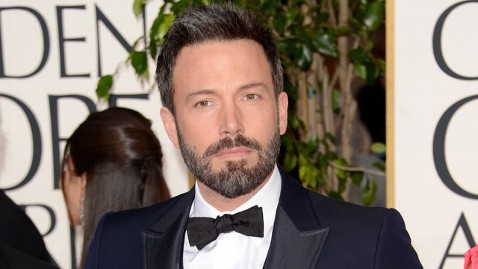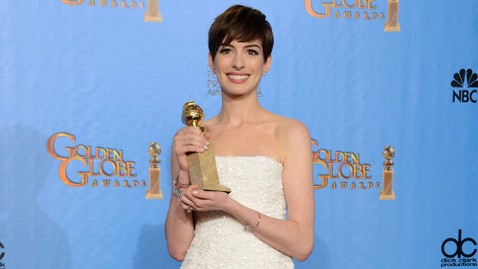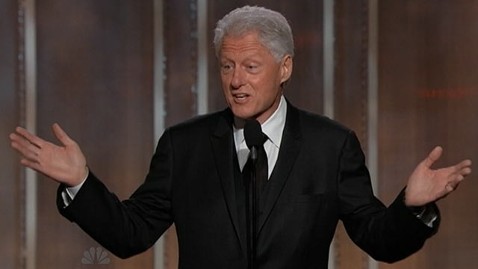
Tina Fey and Amy Poehler: The women of the night. Credit: Paul Drinkwater/NBC/AP Photo.
11:00 p.m. ET: Fey and Poehler sign off: “Goodnight, we’re going home with Jodie Foster.” Can we get them next year, please?
10:58 p.m. ET: The final award of the night, best motion picture drama, goes to “Argo.” Sounds like we’ll be seeing a lot of Affleck, Clooney and the gang in the coming weeks.
10:51 p.m. ET: And best actor in a drama award goes to … Daniel Day-Lewis for “Lincoln.” “Are you sure there’s room for another ex-president on the stage?” he jokes.
10:48 p.m. ET: Jessica Chastain wins for “Zero Dark Thirty.” She calls out director Kathryn Bigelow: “I can’t help but compare my character of Maya to you. … When you make a film that allows your film to allow your character to disobey the conventions of Hollywood, you’ve done more for women in cinema than you take credit for.”
10:47 p.m. ET: It’s time for best actress in a drama — George Clooney’s presenting.
10:41 p.m. ET: Another win for “Les Miserables” — the movie wins the Globe for best comedy or musical.
10:31 p.m. ET: “Les Mis” star Hugh Jackman nabs the Globe for best actor in a movie musical or comedy. He saves his biggest thank you for his wife: “Baby, thank you for always being right.”
10:26 p.m. ET: So apparently Jodie Foster is not retiring. Backstage, when asked by reporters “Are you retiring?’, she said “no, not retiring.” What was she talking about then?
10:22 p.m. ET: Major night for “Girls” — second season premiere is tonight and the HBO hit just won best comedy. Dunham grabs the trophy and screams. “It took a village to raise this very demented child,” she says. “I also promised myself that if I ever got this chance, I would thank Chad Lowe.”
10:17 p.m. ET: Next major award of the night goes to Ben Affleck for “Argo” — best director. (Take that, Oscars.) Steven Spielberg does not look happy.

Credit: Jason Merritt/Getty Images
10:11 p.m. ET: And it sounds like Foster just retired from acting. She says she’s not returning to this stage or any stage: “It’s just that from now on, I may be holding a different talking stick.” People in the audience are wiping away tears, notably Kate Hudson.
10:07 p.m. ET: Foster almost made a huge public statement about her sexuality. Instead, she said she’s single, and she “already did my coming out in the stone age.” “Now, apparently, I’m told that every celebrity is expected to honor the details of their private life with a press conference … You guys might be surprised, but I’m not Honey Boo Boo Child,” she said. “If you had been a public figure from the time that you were a toddler … then maybe you too might value privacy above all else. Privacy.” But she specifically thanked her partner Cydney Bernard, with whom she has two kids.

Credit: Obtained by ABC.
10:06 p.m. ET: Foster accepting her award: “Trust me, 47 years in the film business is a long time. … but tonight, I feel like the prom queen.”
10:02 p.m. ET: Robert Downey Jr. gives a somewhat incomprehensible intro for Jodie Foster, who’s being given the Cecil B. DeMille award for her decades in film.
10:00 p.m. ET: Despite her silence on her relationship status, Taylor Swift WILL NOT be spared: “You know what Taylor Swift, you stay away from Michael J. Fox’s son,” Fey slurs, ignoring Poehler’s objections. “She needs some me time to learn about herself.”
9:58 p.m. ET: Fey and Poehler come back to the mic (finally!) holding drinks. “Everybody’s getting a little lose now that we’re all losers,” Fey says. “Congratulations, Lena. Glad that we got you through middle school.” Poehler says, “Look how drunk Glenn Close is,” Close flails/dances in her chair. Fantastic.
9:52 p.m. ET: Lena Dunham wins best actress in a comedy for “Girls”! She calls Judd Apatow “the greatest honorary ’Girl.’” “This award is for everyone who feels like there wasn’t a place for her,” she says. “This show made a space for me.”
9:50 p.m. ET: Aziz Ansari is pretending the cast of “Downton Abbey” got him high. And Amy Poehler is in George Clooney’s lap. It’s great.
9:46 p.m. ET: “Brave” wins best animated movie.
9:45 p.m. ET: Oh, Sacha Baron Cohen. He’s subbing for Ricky Gervais with an insult-heavy presentation of the nominated animated movies. (Speaking of, where are Fey and Poehler?!)
9:38 p.m. ET: “Homeland” wins again. Claire Danes scores best actress in a TV drama. “I want to thank the other women in this category who are all so badass, so brilliant,” she says. She thanks her costume designer who apparently took her pants out every week while Danes was pregnant last season.
9:35 p.m. ET: The award goes to “Amour,” which picked up a slew of Oscar nominations too.
9:33 p.m. ET: Arnold Schwarzenegger and Sylvester Stallone look hilarious stuffed into suits. They’re presenting the award for best foreign film.
9:27 p.m. ET: It’s a good night for Don Cheadle. His Showtime show “House of Lies” returns for its second season tonight and he just won a Golden Globe for best actor in a TV comedy.
FULL LIST: 2013 Golden Globes Winners
9:23 p.m. ET: Globe for best original screenplay goes to Quentin Tarantino — that’s two trophies so far for “Django Unchained.” He calls the award a “damn surprise” and thanks his friends for listening to him read his scenes. “I don’t want input,” he says. “When I read it to you, I hear it through your ears.”
9:15 p.m. ET: Globe for best supporting actress in a movie (drama) goes to Anne Hathaway for “Les Miserables.” “Blergh,” she says, clearly flustered. “Thanks for that word, Tina.” She also pays tribute to fellow nominee Sally Field for inspiring her to stay in the industry.

Credit: Jordan Strauss/Invision/AP Photo.
9:12 p.m. ET: Best supporting actor in a TV series or movie goes to … Ed Harris for “Game Change.”
9:06 p.m. ET: Jennifer Lawrence wins best actress in a movie (comedy or musical) for “Silver Linings Playbook.” “Oh what does it say?” she asks, looking at the trophy. “I beat Meryl.” She means Streep, of course.
9:05 p.m. ET: Camera pans to Tommy Lee Jones who is not at all amused by Wiig and Ferrell.
9:03 p.m. ET: Kristen Wiig and Will Ferrell are doing a hilarious bit about how they know absolutely nothing about any of the best actress movie nominees. Of Judy Dench in “Best Exotic Marigold Hotel”: “And she’s on that tractor with the marigolds everywhere.”
9:01 p.m. ET: Poehler gushes over “Hillary’s husband.” Fey is still in drag from her bit earlier. They’re amazing and we want to see more of them.
9:00 p.m. ET: Clinton’s presenting a clip of “Lincoln.” Now this makes sense. “We’re all here tonight because he did it,” he says of Lincoln’s battle to end slavery.
8:59 p.m. ET: What, Bill Clinton’s here?! He gets a standing ovation.

Credit: Obtained by ABC.
8:55 p.m. ET: Kevin Costner wins for best actor in a miniseries or movie for “Hatfields & McCoys.”
8:48 p.m. ET: Adele scoops up the Globe for best original song for the latest Bond theme, “Skyfall.” Her reaction: “Oh my God! … Honestly, I came for a night out, with my friend Ida, we’re new mums … I literally came for a night out.”

Credit: Jordan Strauss/Invision/AP Photo.
8:44 p.m. ET: “Life of Pi” wins for best original score … but J-Lo’s nude dress steals the spotlight. Just like her nipple almost did at last year’s Oscars.
8:41 p.m. ET: “Argo’s” real life inspiration, Tony Mendez, joined John Goodman to introduce a clip of the film, which is up for five Globes.
8:36 p.m. ET: Well that was awkward. Some sort of camera malfunction messed up Salma Hayek and Paul Rudd’s best TV drama intro. “Homeland” wins! Executive producer Alex Gansa: “Thanks to everyone who’s been watching ‘Homeland,’ and to those who haven’t, allow me to spoil it for you.”
8:33 p.m. ET: Best actor in a TV drama goes to … Damian Lewis for “Homeland.” Considering it’s a fan and critic favorite right now, not a huge surprise.

Credit: Jordan Strauss/Invision/AP Photo.
8:28 p.m. ET: Hollywood Foreign Press Association president Dr. Aida Takla-O’Reilly disses Jeffrey Katzenberg for never learning her name, asks Bradley Cooper to “call me maybe.” Amazing.
8:21 p.m. ET: And Julianne Moore wins for best actress in a miniseries or movie. “Oh my gosh, my children will be so relieved,” she says. She gives a shout out to Tina Fey and Katie Couric — “two people who made a difference in the 2008 election.”

Credit: Kevin WInter/Getty Images.
8:18 p.m. ET: “Game Change” scores best miniseries or movie. Somewhere, Sarah Palin is probably shaking her fist.
8:14 p.m. ET: We’ll use the commercial break to declare that Poehler and Fey had an absolutely amazing opening bit. Bravo.
8:12 p.m. ET: Second award of the night, best supporting actress in TV: Maggie Smith for “Downton Abbey.” According to Poehler and Fey’s drinking game, you should drink take off a piece of clothing now.
RELATED: Poehler and Fey Reveal Their Golden Globes Drinking Game
8:10 p.m. ET: And the award for best supporting actor in a movie goes to … Christoph Waltz for “Django Unchained.” Hint that he’ll win the Oscar for that part too?
8:07 p.m. ET: Fey almost reprised her Sarah Palin impression while into-ing Julianne Moore but appears to have lost it. Dang.
8:05 p.m. ET: Poehler: “Meryl Streep is not here tonight, she has the flu. And I hear she’s amazing in it.”
8:04 p.m. ET: Fey had a great one for Anne Hathaway and “Les Mis”: “I have not seen someone so totally alone and abandoned like that since you were on stage with James Franco at the Oscars.”
8:03 p.m. ET: Poehler on Kathryn Bigelow and the “Zero Dark Thirty” torture controversy: “When it comes to torture, I trust the lady who spend three years married to James Cameron.” WOW.
8:02 p.m. ET: Oh and they’re not going to be offensive like past host Ricky Gervais. Poehler: ”When you run afoul of the Hollywood Foreign Press, they make you host this show two more times.”
8:00 p.m. ET: Fey and Poehler did an outfit change before stepping up to the mic. Poehler threw the first jab of the night: “You can smell the pills from here. ”
7:44 p.m. ET: “Scandal” and “Django Unchained” star Kerry Washington never Googles herself. She feels like it’s bad for her health. Now you know. Also, she looks gorgeous in Miu Miu.
7:40 p.m. ET: @AngiesRightLeg has met its match: Halle Berry struck a leggy pose on the red carpet in an unfortunate one-shoulder gown.

Angie's Right Leg, meet Halle's. Credit: Steve Granitz/Getty Images.
7:33 p.m. ET: It’s an “ER” reunion! George Clooney and Julianna Margulies just hugged on the red carpet.
7:28 p.m. ET: Best song nominee Adele revealed that she actually had to be convinced to write the theme for “Skyfall.” “It’s a big responsibility doing a Bond song,” she said. “I didn’t want to let everybody down by doing it.”
7:19 p.m. ET: Julianne Moore looks stunning in black and white Tom Ford. She’s up for best actress in a TV movie for “Game Change.”
7:18 p.m. ET: “Mad Men” star Jon Hamm on the best part of playing Don Draper: “Well it’s always fun to play drunk, because if you forget your lines you’re just like, ‘Uh, well, I’m in character.’”
PHOTOS: The 2013 Golden Globes Red Carpet
7:15 p.m. ET: Taylor Swift wore a mermaid-cut eggplant gown … and did not at all talk about what happened with her latest boyfriend, Harry Styles. Sigh.

Credit: Credit: Steve Granitz/Getty Images.
7:14 p.m. ET: Hugh Jackman revealed the “horrible” way he shed weight quickly before filming “Les Mis”: “I lost about 35 pounds in 36 hours before the first scene. I didn’t drink any liquids whatsoever.”
7:07 p.m. ET: Another fashion miss: Jennifer Lawrence. It looks like she stole Madonna’s cone bra and cut off the straps.

Credit: Steve Granitz/Getty Images.
7:02 p.m. ET: “Zero Dark Thirty” star Jessica Chastain diverged from the major trends of the night — nude, black and white, and red — in a powder blue Calvin Klein Collection gown. The plunging bodice looks a bit like a sack.

Credit: Steve Granitz/Getty Images.
6:57 p.m. ET: E!’s mani-cam has become a source of contention. While some actresses happily showed off their nails on the tiny red carpet, Aziz Ansari refused to stick his hand in the diorama-like box.
FULL COVERAGE: The 2013 Awards Season
6:56 p.m. ET: Olivia Munn has a new perspective on newsrooms now that she’s on Aaron Sorkin’s “The Newsroom.” “I think [our show] makes other newsrooms seem pretty easygoing,” she said.
6:42 p.m. ET: Julia Louis-Dreyfus said she had a “little tiny piece of cake” to celebrate her birthday. “Look, this is a corset,” she said, pointing to her Vera Wang dress. “I can’t mess around.” Though she’s up for best actress in a TV comedy, she thinks she’ll lose. “I hope that Lena Dunham or Amy Poehler have their speech ready,” she said.
6:38 p.m. ET: Hosts Tina Fey and Amy Poehler are encouraging their guests to get liquored up. “It’s a party and we want it to remain a party,” Fey said. Both have awesome outfits — a strapless black and white gown for Fey and a low cut tuxedo for Poehler.
6:31 p.m. ET: “Girls” star and Globes nominee Lena Dunham said her stylist gave her very specific instructions about adjusting her dress because “my breasts have a tendency to shove my dress to the right.” She looks lovely in chocolate brown, off-the-shoulder gown.

Lena Dunham. Credit: Steve Granitz/Getty Images.
6:28 p.m. ET: Best actress in a TV comedy nominee Zooey Deschanel showed off her film strip nail art on the red carpet. Very Hollywood.

Zooey Deschanel. Credit: Steve Granitz/Getty Images.
6:22 p.m. ET: Another stunning new mom: Megan Fox. She admitted that husband Brian Austin Green picks most of her dresses.
6:16 p.m. ET: The first surprise of Golden Globes: How utterly amazing Claire Danes looks. She gave birth a month ago and has a flat, practically concave stomach. She tried on her red Versace dress for the first time last night but admitted she’s “been in sweatpants for quite a while.” She added, “I hope I don’t leak.”
RELATED: Claire Danes Flaunts Post-Baby Body at the Golden Globes

Claire Danes dressed her insane post-baby body in Versace. Credit: Steve Granitz/Getty Images.
6:14 p.m. ET: Amy Adams, up for best supporting actress for “The Master,” looks angelic in a Marchesa in a color she called ballet pink. “This is mommy at work,” she said to her daughter back at home.

Amy Adams in Marchesa. Credit: Steve Granitz/Getty Images.
6:12 p.m. ET: Julianne Hough opted for a creepy crawly accessory — her earrings are made out of actual beetles.
6:02 p.m. ET: For Julia Louis-Dreyfus, this Globes is extra special — today is her 52nd birthday and she’s up for best actress in a TV comedy for “Veep.” “Today I’m either a year older & I’m gonna lose a Golden Globe OR at least I’m nominated & I’m not dead yet,” she wrote on her WhoSay page.
6:00 p.m. ET: It’s here, the night that Hollywood has been steeling its liver for: The Golden Globe Awards, which are almost always a raucous time because the Hollywood Foreign Press keeps the bar open throughout the ceremony. We’ll be chronicling all the jokes, insults, red carpet highlights — and of course, the winners — right here. Keep refreshing for the latest updates.
PHOTOS: 2013 Golden Globe Nominees

























